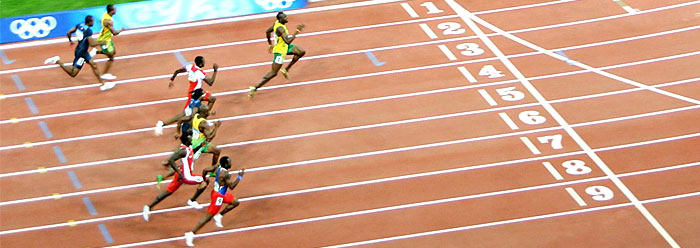Some evolutionists tend to believe that humans are continually improving―getting more robust, smarter, and faster. However, science increasingly indicates that the opposite is occurring.
Anthropologist Peter McAllister recently published a book titled Manthropology: the Science of Inadequate Modern Man. Based on human “footprints preserved in a fossilized claypan lake bed” in Australia, he concluded that those who made tracks across the then-muddy ground were moving at 23 miles per hour.1
Champion sprinter Usain Bolt reached a top speed of 26 miles per hour at the Beijing Olympics last year. But without being slowed down by bare feet and mud to run through, McAllister calculated that ancient Australians would have easily outpaced Bolt, who runs in specialized shoes and on engineered tracks. McAllister also maintained, from his study of fossil bones, that Neandertal women would have rivaled the musculature of today’s weight-training men.
Why is man getting slower and weaker? Why is he now “the worst man in history”? McAllister told the Telegraph that it is because “we are more inactive now than at any time in history.”1
The human body is very dynamic. Barring injury, it will grow stronger in response to physical and other stresses. However, this physiological factor operates strictly within one generation. Muscle growth due to resistance training for one woman does not translate to greater strength in her children.
If having a more active mode of living would bring back to modern humans the strength of the ancients, then surely a rigorously active Olympic training routine would do so. Thus, McAllister’s answer that inactivity is the key would seem to miss the mark. The real question pertains to the loss of strength and speed over succeeding generations.
Interestingly, genetics research has shown a possible mechanism that explains McAllister’s observations. The human genome (as with all genomes) is decaying due to the relentless buildup of mutations every generation.2 These tiny mutations, undetectable by natural selection, could be accruing to erode not only humans’ physical strength, but also their general health. For example, increasing cancer rates may be another manifestation of the genetic damage caused by these “near-neutral” mutations.
Nor does it appear that natural selection can preserve, let alone improve, the particular quality of any given trait. Evolutionist George Johnson perhaps unwittingly illustrated this in his biology textbook The Living World when he wrote, “Thoroughbred racehorses are all descendants of a small initial number of individuals, and selection for speed has accomplished all it can with this limited amount of genetic variability―the winning times in major races ceased to improve decades ago.”3
If McAllister is accurate, the very best times in human footraces ceased to improve centuries ago. But this is not the result of evolution. It is due to the degradation of a fallen creation, once perfect but destined to be remade.4
References
- Usain Bolt would have been outrun by our ancestors, claims anthropologist. Telegraph. Posted on telegraph.co.uk October 19, 2009, accessed October 27, 2009.
- Maddox, B. 2007. Mutations: The Raw Material for Evolution? Acts & Facts. 36 (9): 10-13.
- Johnson, G. B. 2003. The Living World, Third Ed. Boston, MA: McGraw Hill, 156.
- “For, behold, I create new heavens and a new earth: and the former shall not be remembered, nor come into mind” (Isaiah 65:17).
* Mr. Thomas is Science Writer at the Institute for Creation Research.
Article posted on November 2, 2009.




